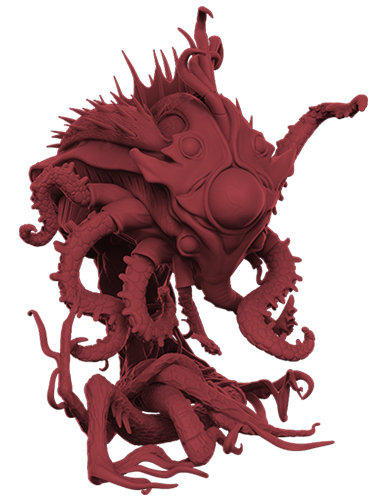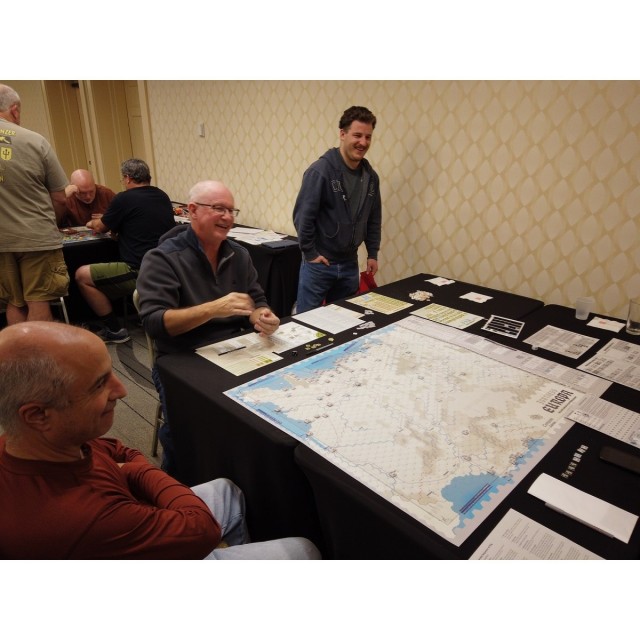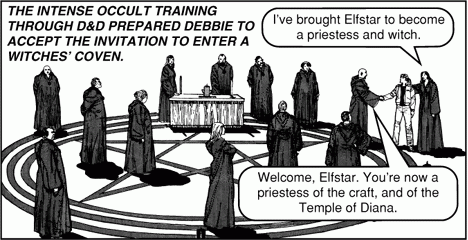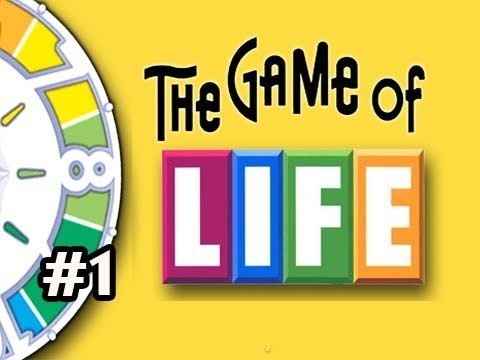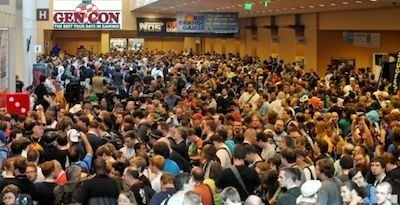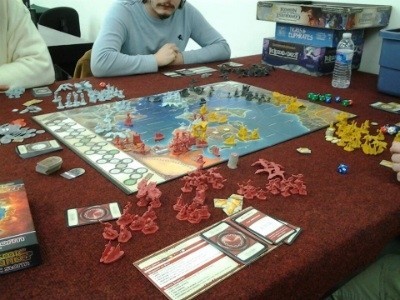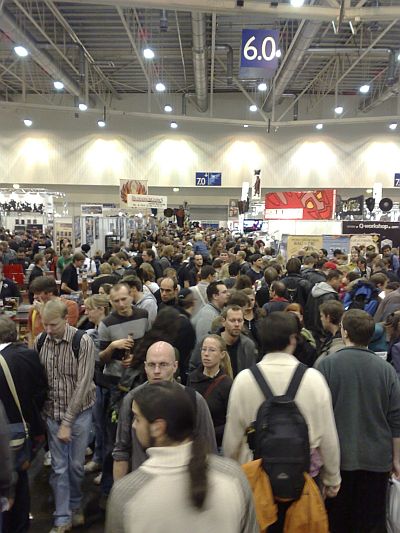
Put four men in a car for a three hour drive and you end up in a different part of the world. Not only is there a lot of catching up to do, life-wise, but there's lists of anticipated releases to go through. So that by the time we arrived at the Essen fair, our patience was severely tested having to stand in a queue. And by the time we were inside I was deviously tricked into a bloody train game, not worth mentioning and a waste of good time. I wasn't having that again.
Having learned from experience, we had decided to attend Thursday and Friday as they are not as crowded as the Saturday. Essen is a kind of juggernaut. It's big enough to crush you under the sheer opportunities. You want to try a lot of things, there just isn't time. There was stuff, like the Eagle and the Star card driven wargame about the 1921 Polish-Soviet war, that I just didn't get to.
The main halls harbour the major publishers, like Goldsieber, Kosmos and Hans im Gluck, as well as minors like Queen, Asmodee, Eggert and Nexus. Here the focus is on Euros, family and kids games, with lots of opportunities to play, and dozens of tables for Small World, Opera and Cyclades.
For AmeriTrash minded gamers, it's best to stick to the halls further from the entrances. One of them has Heidelberger (which includes most FFG products), Z-Man and Alderac. The others host a large number of small publishers, mostly from the European fringe and further away. In this area you will also find quite a few stores selling comics, live roleplaying equipment, fantasy miniatures and miniature terrain.
Apparently, there were 763 publishers at the show, of which 44% were non-German (the highest rate yet) with 600 new releases. According to my friend, who works in the gaming industry, this is more a reflection of the lower production costs of games (allowing smaller print runs) and greater use of expansions than of creative blooming.
Of course there is still a lot of copying past success in the new releases. Shipyard and Dungeon Lords draw heavily on other multiplayer solo worker placement ancestors like Le Havre. Every successful board game gets the card or dice treatment (Cardcassonne, Roll Through the Ages), and there were a few just too obvious Agricola rip offs. Thunderstone rides on the Dominion deck building craze, but at least it offers theme and setting, and I hope to try it soon.
However, the tables at Heidelberger, Phalanx, Alderac and Z-Man were crowded all day, which I think was a good sign because they offer an alternative to the euro majority. We only managed to get into a game of Bushido by making it straight from the front of the queue on Friday morning. By then only the table of A la Carte was still empty.
The last couple of years publishers from outside the Germany, France and the US are coming out really well: the staff at the booths is eager to explain and demo the games. Sometimes the English or German is a bit of a barrier (but not at Kuznia Gier! Hats off!). A problem that might not be so apparent at US game shows, but language is a significant obstacle in the Old World.
Koreans, Chinese and Japanese, seemed to have the most problems with English and German, and in two instances could not convince me of the design. Dungeon War and Greedy Kingdoms seemed pretty standard fantasy (and very similar): a couple of character cards, buildings, some attacking and developing your assets. And if not, as Sydo's enthusiastic review of Dungeon War suggests, this was entirely to blame on the ramshackle explanation of the game. We felt no urge to sit down and play.
The Korean pavilion had hired a number of Germans to explain the games, which worked fairly well. It didn't save Caterpillar, Age of Tank, though. To me, the quirky game board (with three almost identical shades of grey denoting different terrain types) and the idea of a pick up and deliver game with tanks occasionally taking shots at each other was was actually endearing. But there really isn't much else in the game.
The use of locals to explain the games is also not a 100% chance of success. Not all of them seem to be enjoying it, and maybe only do it to get into the event for free. The scene at Alderac was painful, even though I turned up close to closing time. When I asked to have the rules of Arcana explained to me (an obvious sign of willingness to buy), I was sent to “the guy who knows all about Arcana”, who then passed me on to someone not very fluent in English (which is not a deadly sin) but then had little idea of what the game was like. I didn't feel bad about keeping my money in my pocket. I can't imagine this would have happened at Kuznia Gier.
Overall, I think that the addition of the smaller European countries to the gaming market has a very positive effect. First of all, these publishers have a fresh view on mechanics and themes. It certainly has broken the ban on violent and politically incorrect themes and aggressive game play. Also, it will forever break the geographical connotations to eurogames and Ameritrash, which we can only applaud.
In all, I came back from this Essen with a couple of good games, knowing that the future of boardgaming is not that bleak. But it means looking beyond the lists on BoardGameGeek, which follow the mainstream, and beyond to a bunch of relatively new publishers. I'm not saying that everything they are putting out is game Z, or even game S or game K material, and true, some of them will be converted to pouring out euros (I'm looking at you Vlaada Chvatil!), but there is something going on there. That we might benefit from it!
The games
Although we arrived at Kuznia Gier stand looking for Kingpin, we were drawn into a game of Rice Wars. We soon found out that despite the conflict, it didn't feel very epic. We then moved on to Kingpin, with such beautiful artwork (reminding me more of Hugo Pratt than Sin City) that I gladly paid the 25 euros. This game shows rapid improvement in production values (also in the quality of the game board and tiles) when compared to Wolsung and Rice Wars, games released only last year.
Modern Society by Finnish Tuonela Games proved a let down, trying bravely to model modern politics in a card game. Event cards are played to push issues up the political agenda, which allows you to propose laws. A lot of time was spent watching which other cards had been played in case they might offer a bonus, which was a pain that could have been prevented by clever graphics. But my greatest disappointment was that the laws only offered bonuses on your own cards instead of giving you an ability to interfere with the actions of other. So the passing of a law enshrining individual rights had no influence on the functioning of the state. A missed chance, both in terms of thematical accuracy as of player interaction.
So I left with the thematically appealing games of Bilekuosi (Dope Fiend, published by compatriots Mind Altering Games), which sees the players trying to score a wide variety of drugs before going clubbing, whilst avoiding permanent brain damage, insanity or death. The rules offer a useful index of all drugs involved. Find out about all different kinds of drugs (from DXM through MAO-I to nitrous oxide) and the various uses of condoms while trying to score! “Very controversial,” the girl behind the counter told me, twice.
Also took Inquisition from Tuonela, a game on torture and confession, which I hope to try out soon. The themes are refreshingly non-PC and mostly untried in eurogames (remember Grass, though).
Spanish publisher Gen X, the guys that gave us Dos de Mayo (and Mecanisburgo, sigh), have released Luna Llena (Full Moon), a game where a group of backpackers finds itself up against a pack of werewolves who need to make sure that none of them escape and that one of them becomes a werewolf to ensure survival of the pack. I think this will turn out to be one of the great AmeriTrash games to come out this year, but hampered by a confusing rulebook. I hope to do a full review of this game in time.
In the field of longer established publishers, Z-Man's Endeavour might be okay, but I didn't really feel drawn as I saw that it mostly means buying buildings that allow you new actions. It sounds like ground well covered. We also tried out Dungeon Lords here, which is not as dull as some people fear, but it is still multiplayer solo, with some interaction in worker placement. The theme works well, though, mostly because of the pretty components.
Megacorps, on the other hand, may not have the looks, but it certainly has the right stuff. As players you are a multinational corporation dangling in various industries in various superstates. These can be invaded to gain control, aided by your mercenaries. A stack of event cards breaks open the positions on the board. The political system of the superstates determines what happens if that government (controlled by one of your opponents) kicks you out. In democracies, at least you get your investment back, but in kleptocracies it just gets taken over by the other player and in a dictatorship it gets nationalised. There's constant wheeling and dealing and attacks, but in the end it's down to the largest stack of cash.
Tammany Hall (Stratamax) proved a near miss. It has the great theme of ethnic political machines in 19th century New York, but it remains a fairly straightforward area control game, with some nice additions, like the offices that have to be distributed by the new mayor and which offer the holders special abilities. It lacks the spirit of the Gangs of New York and we left wishing it had had some special historic events, like the Draft Riots.
Bushido (Heidelberger) had a good feel to it. It is about fighting battles, and although abstracted, that is what you feel you are doing. The daimyo (active player) determines which player will be leading his armies into battle, against which other player and who will control the distribution of honour afterwards. So interaction is high and the fact that you always need other players to get things done means it has great opportunities for stitch ups and maintaining the balance of power at your own expense. We were a bit let down about the end game, which felt anti-climactic, but that just may be a one time problem. If I can find it cheap, I will give it a go.
I steered clear of Rise of Empires (which looked too much like Struggle of Empires and Byzantium in turn structure), Caligula. Dominion Seaside, Last Train to Wensleydale.
I missed Ghost Stories, Myth: Pantheons, Longships, Galaktiko, Zombiaki Atak na Moskwe.
I peeked at Battles of Napoleon (not released yet), War of the Ring Deluxe (overpriced, but beautiful), Adventurers, Rush 'n' Krush.
Also played Chaos in the Old World, Kill the Hippies, Obscura Tempora.
Also scored Maria, Hell of Stalingrad, Warhammer Invasion.
But I will leave you with a blast from the past. We picked up Azteca, a Tilsit release from 2000. Now remember that Tilsit also brought you La Revolution Francaise, Europa Universalis (the precursor of the computer game) and Hispania (a Brittannia variant) and you know these guys are vintage AmeriTrash. This game is true to form, although not with plastic. But the artwork is beautiful. There's loads of counters and the game has an epic time scope. Expect a long evening.
The players try to establish their dominance over the valley of Lake Mexica, so they can gain as many slaves as possible to sacrifice to Quetzlcoatl. However, the feathered snake-god is not the only one demanding sacrifice. Tezcatlipoca, the jealous god of night also needs to be appeased. To achieve this the players need to pool their sacrifices, because failure to sacrifice will lead them all to be devoured by the darkness. This offers interesting free rider problems.
In the meantime you send out your armies to conquer other tribes, send out diplomats to gain allies or spy on enemies and buy slaves on the slave market (of which you have limited information). A stack of event cards gives you advantages in different parts of the turn, but also the opportunity to screw over your opponents. The whole game rewards aggression, through the capture of slaves and the fact that your hand of event card is filled up each turn. As far as I'm concerned the theme and game play fit like hand and glove and this one will be back on the table. You should be able to track them down second hand. Highly recommended!
 Games
Games How to resolve AdBlock issue?
How to resolve AdBlock issue? 

